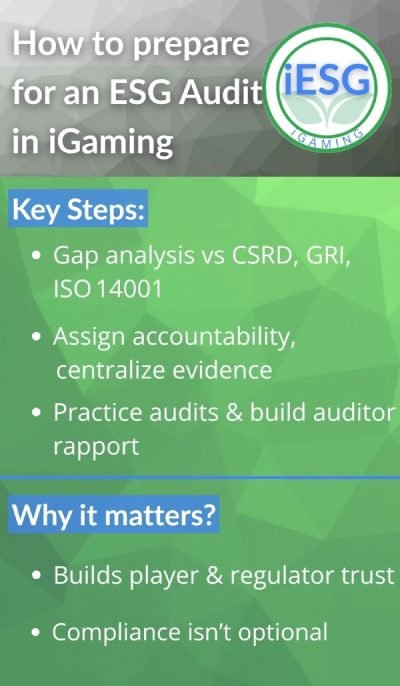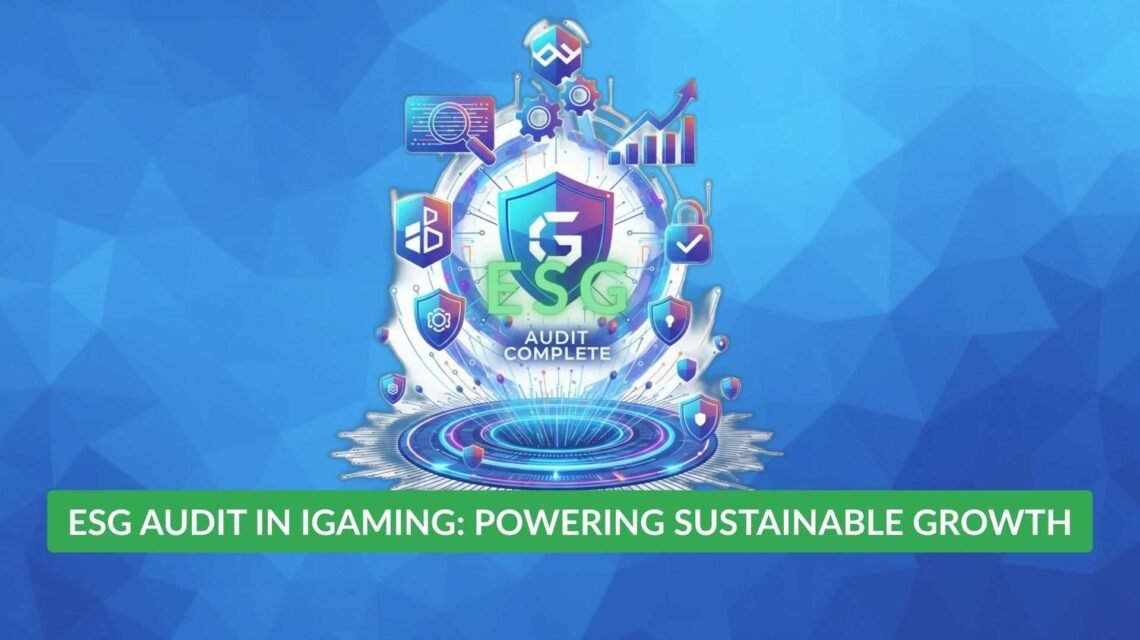There’s been a real shift in what matters most for iGaming operators, and it’s not just about new games or conversion rates anymore. Increasingly, it’s the pressure to prove every claim through a rigorous esg audit in igaming.
What once was a tick-box exercise for compliance has become the standard for trust and even the right to compete for high-value deals. Any sustainability claim made without proof simply doesn’t cut it anymore.
As frameworks like the CSRD take root and get real enforcement, operators are finding out that audit readiness is a continuous priority – not just something to dust off once a year.
Why ESG Audits in iGaming Matter
Stakeholders, such as regulators, investors, and even the gaming community, now expect every promise to stand up to outside scrutiny. That’s what makes an ESG audit in igaming so central to day-to-day strategy.
- Regulatory scrutiny is moving up a gear. Directives like the CSRD are shifting disclosures from voluntary to mandatory, with real teeth for enforcement.1
- Auditors and financial backers are digging deeper than ever. When documentation falls short, opportunities vanish. Regulators and partners don’t hesitate to move on.4
- Players are watching closely. Younger generations in the player base are paying attention—not just to big promises, but to proof of real action. In a sector where credibility can disappear in an instant, a completed esg audit in igaming is a visible sign that a company is willing to back up its words.3
It’s rarely enough to have the right policies on paper. Auditors drill into the numbers, governance records, and actual outcomes … digging for proof that ESG commitments translate into day-to-day decisions and trackable impact.2
Step-by-Step: Preparing for an ESG Audit in iGaming

Scrambling to organize documents at the last minute almost always leads to missed details and unnecessary stress. Operators leading the pack see the ESG audit in igaming as something to build into the fabric of daily work.
#1. Conduct a Candid Gap Analysis
Too many firms rely on generic checklists and miss what really matters. Start by holding a mirror up to daily practices and measure them against top standards: CSRD, GRI, ISO 14001.1 Honest benchmarking not only finds holes, but sometimes highlights strengths that haven’t been put to use. Teams who take this step early are rarely surprised by auditors.
#2. Define Accountability
ESG is not a side hustle. Make it explicit who is on the hook for what – across compliance, operations, and sustainability. Assign a project lead. Every team needs to know exactly which data or process sits with them. This clarity prevents the “not my job” gaps that can sink an audit.
#3. Make Evidence Second Nature
Auditors aren’t looking for big promises. They want receipts. Documentation is the difference between a strong audit and a weak one. For each ESG commitment, expect to provide metrics, logs, and clear outcomes. In many cases, outside validation goes a long way. Messy spreadsheets or ad hoc tracking can cause headaches and raise red flags.4 It helps to treat all data, no matter how minor, as something that should be ready for inspection at any time, not just during the audit window.
#4. Practice Under Real Conditions
Some of the most successful iGaming operators make practice audits routine. By running quarterly dry runs and pushing teams through real-world scenarios, they turn audit readiness into a familiar part of business life – exposing areas to improve well before an external review.5
#5. Build Relationships with Auditors
Starting the conversation with auditors well before the scheduled audit can make all the difference. Early engagement – asking questions, clarifying what documentation is needed, and requesting their latest checklists – sets a tone of openness and usually uncovers quick wins.4
Quick Audit-Ready Checklist:
- ESG records: current, centralized, and thorough
- Data trails: validated and always accessible
- Board and executive oversight: clearly documented
- Recent internal audit: completed and improvements tracked
- Stakeholder communications: ready to go
Operators who build the audit into their yearly planning, treating it as a key checkpoint, not a fire drill, tend to move through the process smoothly and spot risks early.
Building Audit-Ready ESG Reporting for iGaming
In practice, the companies that excel in the esg audits in igaming don’t just focus on paperwork before the deadline. Instead, audit thinking is woven into daily workflows.
Centralize and Automate:
Manual data wrangling is a major source of errors. More teams are moving to automated ESG tracking tools that gather records, build audit trails, and ensure no detail gets lost. Platforms like Greenstone or Microsoft’s suite are making this easier.4
Speak the Language of Standards:
Adopting recognized standards doesn’t just streamline external reviews – it also helps align teams internally and sets clear expectations across departments.1
Invest in Team Know-How:
Preparing for an audit shouldn’t fall only on compliance managers. Making sure every team – from HR to tech – gets regular ESG training helps prevent misunderstandings and catches gaps long before audit season.
Put Progress on Display:
Making ESG progress public – through detailed reports or real-time dashboards – sends a clear message to everyone watching, from authorities to end users: this operator is committed to results, not just good PR.5
Stay Adaptive:
With regulations and expectations always evolving, only operators who update their ESG playbook regularly avoid last-minute surprises.1
Turning Audit Outcomes into Strategic Advantage
There’s a difference between “passing” and actually leading. The operators who use each esg audit in igaming to fuel the next round of improvements are the ones that become reference points for the sector.6
- Turn feedback into action:
Audit recommendations aren’t just about fixing what’s broken. They’re a practical guide for where to invest attention and resources before small issues turn into major problems.
- Showcase wins:
When the audit results are strong, don’t keep it quiet. Sharing those wins – through our iESG certificate, case studies, and announcements – helps open new doors with partners and reassures customers.5 - Make improvement routine:
For operators that want to stay at the forefront, each audit cycle is more than a review. It’s a chance to rethink targets, sharpen processes, and raise the bar for what comes next.
Conclusion: ESG Audit in iGaming
A strong ESG audit in iGaming is a sign that a business is built for the long term. Operators who weave audit thinking into daily life earn a level of trust and resilience that outlasts market trends and regulatory swings. In a world where expectations are rising and scrutiny is sharper than ever, those who treat audit preparation as a foundation – rather than a scramble – will lead the sector forward … on their own terms.
FAQ – ESG Audit in iGaming
What is an ESG audit in iGaming?
An ESG audit in igaming is a formal, independent review of a company’s environmental, social, and governance data, processes, and public disclosures.
What documentation is essential for an ESG audit in iGaming?
Auditors expect up-to-date environmental stats, records of social impact programs, clear governance policies, and an audit trail for every data point.
Which frameworks shape the ESG audit in iGaming?
CSRD, GRI, and ISO 14001 are among the most widely used global standards.1
How often is an ESG audit in iGaming required?
Many markets now require annual external audits; regular internal reviews are recommended for best results.6
Where do most companies fall short in an ESG audit in iGaming?
The most common gaps are incomplete records, lack of cross-checkable data, and unclear lines of accountability.4
Is an ESG audit in iGaming mandatory everywhere?
Rules vary, but leading markets increasingly require routine, third-party ESG assessments.2
Why does an ESG audit in iGaming matter for reputation?
Passing an audit proves a company’s claims and builds confidence among investors, partners, and players.3
Sources:
- European Commission: “Corporate Sustainability Reporting Directive (CSRD)“
https://ec.europa.eu/info/business-economy-euro/company-reporting-and-auditing/company-reporting/corporate-sustainability-reporting_en - McKinsey & Company: “The ESG Premium: New Perspectives on Value and Performance”
https://www.mckinsey.com/business-functions/sustainability/our-insights/the-esg-premium-new-perspectives-on-value-and-performance - PwC: “Consumer Insights Survey 2024″
https://www.pwc.com/gx/en/industries/consumer-markets/consumer-insights-survey.html - BDO: “ESG Strategy for Gaming“
https://www.bdo.com/insights/industries/gaming-leisure/gaming-companies-unlock-the-power-of-esg-strategy-and-investment - Kindred Group: “Sustainability Reporting“
https://www.kindredgroup.com/sustainability/sustainability-reporting/ - Fitch Ratings: “Global Gaming Market Report“
https://www.fitchratings.com/research/corporate-finance/global-gaming-outlook-2025-13-12-2024

